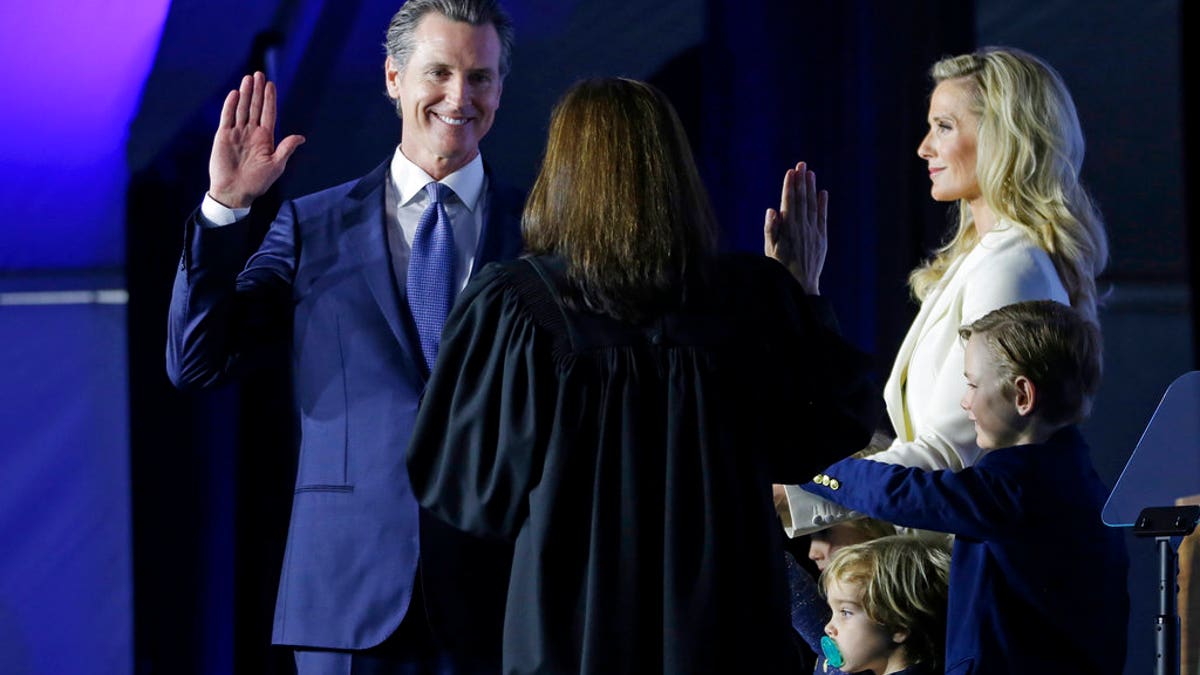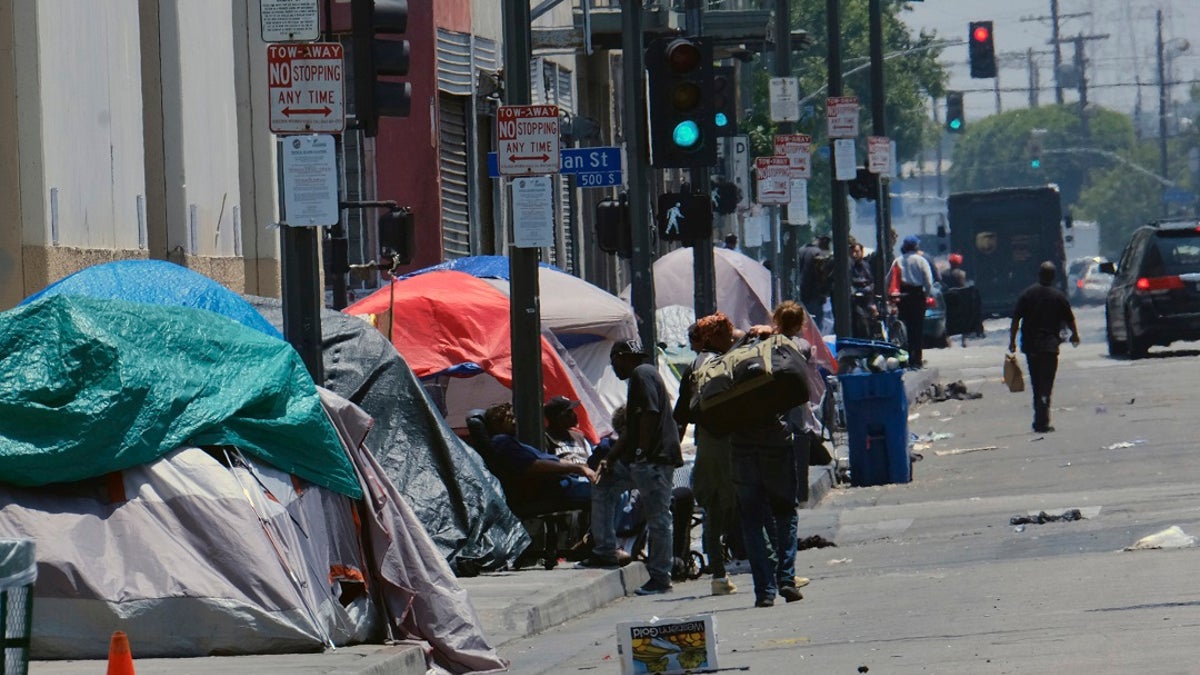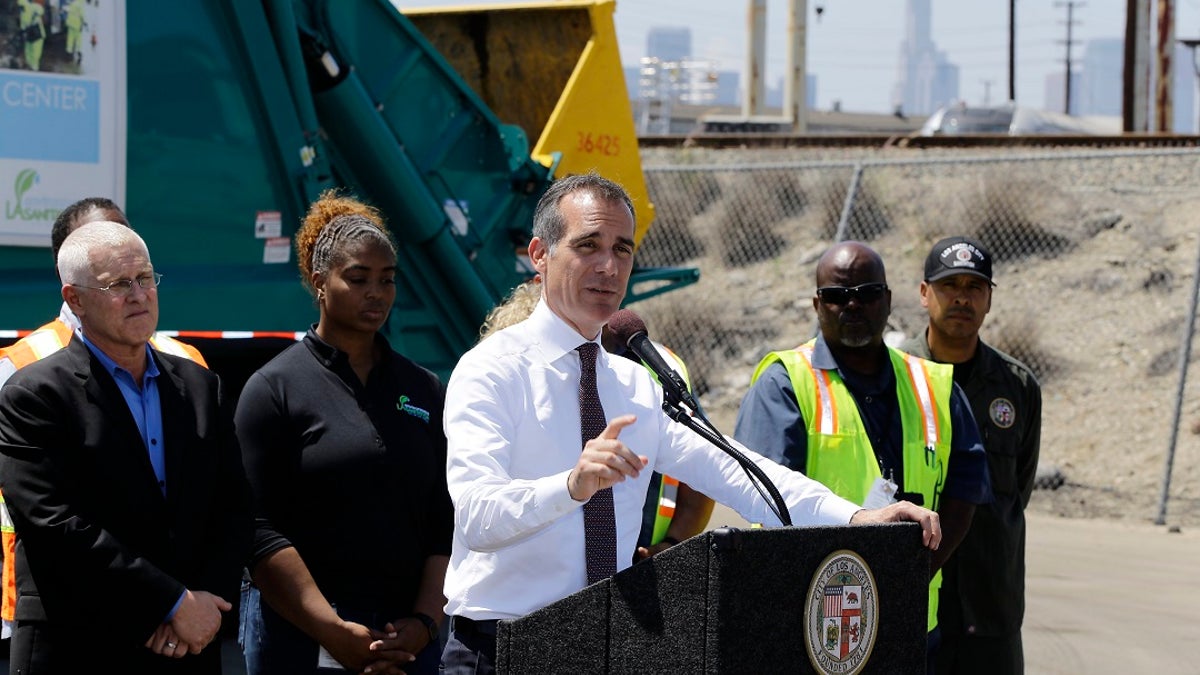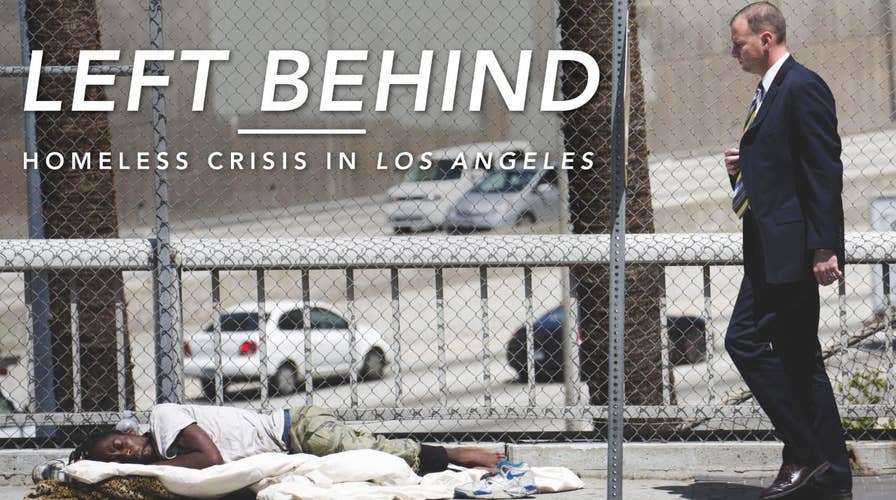Left Behind: Homeless Crisis in Los Angeles
In a tour of Los Angeles, Fox News witnessed the failed government policies that have led to decades of neglect and mismanagement fueling the city's homeless crisis.
In the summer of 2019, Fox News embarked on an ambitious project to chronicle the toll progressive policies have had on the homeless crisis in four West Coast cities: Seattle, San Francisco, Los Angeles and Portland, Ore. In each city, we saw a lack of safety, sanitation and civility. Residents, the homeless and advocates say they've lost faith in their elected officials' ability to solve the issue. Most of the cities have thrown hundreds of millions of dollars at the problem only to watch it get worse. This is what we saw in Los Angeles.
LOS ANGELES -- It's the stale stench of liquor and human waste that hits you first. Then it's visual -- row after row of dirty tarp tents crammed together on the sidewalk next to piles of rotting trash and broken appliances. There are half-dressed, drugged-out shells of people wandering aimlessly in the middle of the street. Some curse at cars. Others just stare. There are fights, prostitution and rodent burrows. This is the fabled Skid Row in Los Angeles and it's a disaster.
Like several West Coast cities Fox News visited, Los Angeles is dealing with a homeless crisis. However, unlike the East Coast, LA can't hide all of its homeless in shelters or low-income housing.
LA PUSH TO DEVELOP SKID ROW PROMPTS NEW CLASHES IN CALIFORNIA'S HOMELESS CRISIS
Failed liberal policies coupled with decades of neglect and mismanagement have turned an old problem into a modern-day nightmare. Some fear the City of Angels is at the point of no return and are angry at elected officials who talk a big game but rarely deliver.
"I don't want to see them on camera anymore," Marquesha Babers, who lived on Skid Row as a teenager, told Fox News. "I don't want them to write any more articles about how much they care or how much they're trying to change things. I want to see them do it."
LA TIMES COLUMNIST SLAMS CITY LEADERS FOR FAILING TO TACKLE HOMELESS CRISIS
Across the state, officials have long lamented the horrors of homelessness while failing to pass any meaningful legislation. Homeless advocates accuse those in charge of using the crisis to further their own political aspirations and manipulating an environment that allows them to dodge accountability.
"The best we get out of those elected to deal with problems are soundbites," Pete White, the founder of the Los Angeles Community Action Network, told Fox News. "Soundbites that say 'it's a humanitarian crisis' and that 'we have to do something' only to see that something be either nothing or pathways to criminalization."
The best we get out of those elected to deal with problems are soundbites.
California accounts for most of the country's homeless population. Despite throwing hundreds of millions of dollars at the problem, the number of homeless in Los Angeles County has risen for the third time in four years. The most recent count released in June by the Los Angeles County Homeless Services Authority shows that there are nearly 60,000 homeless people living without permanent shelter on any given night. In the city of Los Angeles, the number of homeless in 2019 jumped 16 percent, to 36,000, while the number of chronically homeless -- those who have been living on the streets for more than a year -- rose by 17 percent. A staggering three-quarters of the city's homeless population is unsheltered.
The sobering statistics come after two voter-approved tax hikes and a $619 million effort last year to tackle the problem through social services and new housing.
The latest uptick in numbers prompted dramatic press releases, anguished editorials and a ton of finger-pointing by elected officials. In the merry-go-round of blame, local officials claim the state isn't doing enough. California's governor says it's Washington's fault for slashing federal funds and President Trump responds by taking aim at the Democrats' governing skills.
"California is a disgrace to our country," Trump said during an August campaign rally in Ohio. "It's a shame. The world is looking at it. Look at Los Angeles with the tents and the horrible, horrible disgusting conditions."
Several Angelenos Fox News spoke to agree and say they're frustrated by the pace of progress.
"It looks like things are getting worse, not better," Whitney Beard, a worker at a coffee shop in downtown LA, told Fox News. "We've been hearing the same thing on loop for years."

California Governor Gavin Newsom takes the oath of office from state Supreme Court Chief Justice Tani Gorre Cantil-Sakauye during his inauguration Monday, Jan. 7, 2019, in Sacramento, Calif. Looking on is Newsom's wife, Jennifer Siebel Newsom and their sons, Dutch, second from right, and Hunter, right. (AP Photo/Rich Pedroncelli)
Things were supposed to change in November, when California Democrats scored the trifecta of legislative wins: both houses of government and the governorship. With two-thirds of votes likely in place and Gov. Gavin Newsom's pledge to make housing a priority, there was optimism in the air. That ended when Democrats struggled to get on the same page and pass legislation that would have increased the state's housing supply. They also blew another high-profile measure that would increase residential development near transit strops and in single-family neighborhoods.
Other failures were chalked up to division among special-interest groups and a hands-off approach by the governor's office -- though he denies it.
Babers, who lived on Skid Row when she was 15, says she feels used by officials trying to score political points and wants the lip service and Oscar-worthy promises to help when the cameras are rolling to come to an end.

FILE - In this May 30, 2019 file photo tents housing homeless line a street in downtown Los Angeles. (AP Photo/Richard Vogel,File)
The political theater was on full display during a June press conference on the south steps of City Hall. The photo-op and presser was pitched to Fox News as a historic one and we were told the city was finally going to start getting serious about its spiraling crisis. But instead of addressing one of the worst man-made disasters in U.S. history, council members took turns mugging for the cameras and bashing Trump.
One mile away, among the dirty needles and broken bottles, White says he's frustrated but not surprised.
There's even a running joke among the homeless living in downtown LA. They mock elected officials who claim breathlessly how "shocked" they are by the rise in homelessness and the deteriorating conditions on the street.
"They're shocked! Shocked!" one woman living on Skid Row said, exasperatedly channeling Captain Renault from "Casablanca." "Why are they shocked? We've been down here this whole time. They're the ones who don't come down here."
Why are they shocked? We've been down here this whole time. They're the ones who don't come down here.
Though there are homeless encampments popping up on freeways and underpasses, the largest concentration of LA's unsheltered population calls Skid Row home. The downtown neighborhood, memorialized in the film "The Little Shop of Horrors" as the last resort for winos and junkies, has long been a dumping ground for hospitals, prisons and other cities and states looking to offload their homeless. Today, the roughly 50-block district just east of downtown is a dystopian panorama of human misery, where vacant-eyed residents shuffle in and out of their makeshift shelters, navigating around broken wheelchairs, discarded syringes, garbage and human waste. The unsanitary conditions have turned it into a veritable petri dish of disease that's ripe for rodent infestation.

A homeless person sits at his tent along the Interstate 110 freeway in downtown Los Angeles in May 2018. Mayor Eric Garcetti is paying a political price for the city's homeless crisis. An effort is underway to recall the two-term Democrat from office prompted by widespread complaints about homeless encampments throughout the city. (AP Photo/Richard Vogel, File)
It's gotten so bad that Newsom brought it up in his 2019 State of the State Address.
"Our homeless crisis has increasingly become a public health crisis," Newsom said. "Last year, there was a hepatitis-A outbreak in San Diego. Recently, there was an outbreak of syphilis in Sonoma. And now, typhus in Los Angeles. Typhus. That's a medieval disease. In California. In 2019."
Our homeless crsis has increasingly become a public health crisis... And now, typhus in Los Angeles. Typhus. That's a medieval disease. In California. In 2019.
TRASH HEAPS IN DOWNTOWN LOS ANGELES CONTINUE GROWING MONTHS AFTER MULTIPLE TYPHUS CASES: REPORT
Today, there are few, if any, big-picture solutions on the horizon.
Outraged residents say they are ready to hold their elected officials' feet to the fire.
Los Angeles Mayor Eric Garcetti is already feeling the heat.

Los Angeles Mayor Eric Garcetti, at podium, surrounded by city sanitation workers, speaks about the city's homelessness problem at a news conference in Los Angeles on June 19, 2019. Far left, is city councilman, Mike Bonin. (AP Photo/Damian Dovarganes)
The Democratic mayor who had been flirting with a 2020 presidential run came under scrutiny for not treating the homeless problem with enough urgency. His office announced plans in 2018 to build 15 shelters, but things had gotten off to a slow start. In 2016, voters approved Proposition HHH, a $1.2 billion bond to build 10,000 housing units for the homeless, but so far only a handful have opened. The two-term mayor, though, argues the crisis would be far worse without his leadership.
Not everyone is convinced.
CLICK HERE FOR THE FOX NEWS APP
In June, political commentator Alexandra Datig launched a long-shot effort to remove Garcetti from office. She claimed the mayor couldn't "handle the crisis" and that "he needs to step down."
Garcetti, who has argued that the greatest political progress takes place locally, chalked up the recall effort as a "political game."


